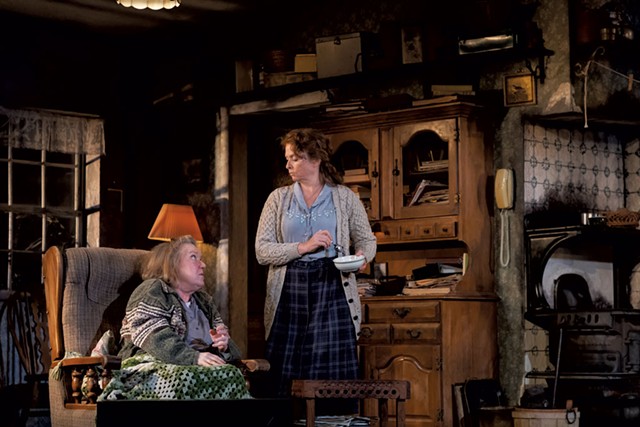
- Courtesy Of Joey Moro
- Kristine Nielsen and Maxine Linehan in The Beauty Queen of Leenane
An old woman lumbers into a cluttered parlor and settles in a ragged, overstuffed armchair. Her hands flutter as she adjusts her afghan, and then her daughter arrives home, shaking off the rain. A kind of small talk follows, but these exchanges are not pleasantries. Viewers will learn to watch the characters closely in The Beauty Queen of Leenane, because Mag and her daughter Maureen have perfected spiteful, unceasing warfare. In Dorset Theatre Festival's magnificent production, the performances are the centerpiece.
Playwright Martin McDonagh has created a startling plot of psychological violence, and director Theresa Rebeck steers a cast of four fine actors who deliver all the play's stark power. The text's emotional bluntness can startle, but just as often it registers as humor. McDonagh's characters are tragic but intensely human, and laughter lets us recognize their absurdity.
The setting is a rural West Ireland cottage in the 1990s. The place is crammed with tired and useless things, and the kitchen still holds a large cast-iron stove. Dorset's set includes a low, patched plaster ceiling to amplify the room's resemblance to a burrow that the creatures don't feel safe leaving.
The plot seems simple at first: A needy parent holds her daughter back; a last chance at love emerges. McDonagh uses those familiar elements to build a dark story of emotionally damaged people who see little hope. They dream of nearly nothing and, when stretched to the snapping point, lose sight of the border between fantasy and reality.
Forty-year-old Maureen and her mother, Mag, live in isolation, with a TV and radio that work but need a hard rap from time to time. Mag is quite the passive-aggressive genius, pasting a sweet old lady's smile on her incessant requests, rippling with a none-too-cheerful Irish lilt. "Me mug o' tea you forgot!" she chirps, digging until she gets what she wants, which is her daughter's exclusive attention. But Maureen has her own fighting style, arguably justified after losing her own future to serve her mother.
The two can probably sustain their emotional manipulation to the end of time, but Ray, the slightly muddleheaded neighbor, brings Maureen a message that might help her reconnect with his brother Pato, now back from London. It might lead to some happiness, but truth and fiction blur in this play. The audience begins to wonder what these people are capable of, for good or ill.
Beauty Queen, McDonagh's first play, debuted in 1996 at the Druid Theatre in Galway, Ireland, to great success. The 1998 Broadway production was nominated for Best Play at the Tony Awards and won the Drama Desk Award in that category. McDonagh is best known to American audiences as the screenwriter of Three Billboards Outside Ebbing, Missouri and The Banshees of Inisherin.
Nearly 30 years after its premiere, the play's story of despair in a rural setting with a ruined economy has stayed current, and the mother-daughter struggle remains potent. McDonagh refuses to sugarcoat a single thing. Even the sweets Maureen serves with tea are selected to hurt — she offers a cheap brand of cookies that Mag hates. Maureen loathes them, too, but she won't grant her mother a moment's pleasure. McDonagh exterminates all sentimentality, leaving us characters destined to harm each other.
Rebeck establishes the drip-drip tension of the story with rain effects outside the cottage and emotional depth within. Each character expresses need through focused hesitation. All four are always on the edge of decisions, and for Mag and Maureen, those choices are often about the extent of cruelty they'll undertake. Rebeck paces the emotional warfare to best effect, each insult met with a sulk or counterattack. McDonagh's deadly serious dialogue is unsparing, and Rebeck lets the sinister edge sizzle throughout.
Dorset's cast features Broadway, television and film star Kristine Nielsen. As Mag, she exquisitely portrays the character's glissando lunges between childish wheedling and impulsive malice. Alone in the cottage, Mag performs a treacherous deed, her eyes glinting with madness until she retreats to her chair with an anxious look that finally dissolves into eerie calm. Nielsen hits each singular note. Mag has mastered the pitiful smile of the helpless, controlling her daughter while hiding her triumph. Nielsen plunges deep into the character's dangerous, gleeful hostility.
Maxine Linehan reveals Maureen's vitriol right alongside her suffering. Veering from sympathetic to steely, Linehan produces a character skilled at hiding her thoughts. A weary soldier in a wool cardigan, her Maureen drags with exhaustion while seeing to her mother, then snaps into vivacity when she brings a date home. Maureen and Pato have no ease in flirting but hammer at it nonetheless. Linehan balances Maureen on a knife's edge of need and hopelessness, then completes the transformation of the morning after by flaunting a new shamelessness to Mag.
David Mason, as Pato, portrays a character rooted in shyness but mimicking the bravado of a pickup artist. Pato has his own layers, and Mason excels at conveying his unadorned version of romanticism in a tender letter. Pato is as straightforward as Maureen is devious, and Mason shows his simple courage.
Eimhin Fitzgerald Doherty gives Ray a twitchy presence, head constantly swiveling to take in the room. He writhes anxiously in his ill-fitting sweatpants and sports jersey, delivering observations that swoop from childish to cunning. The character seems a bit daft, and Doherty plays him as a sparking live wire, wildly unselfconscious.
Dorset's impressive set, costume, lighting and sound design focuses our attention on the decaying cottage and its miserable occupants.
These characters can assume that a life of disappointment lies ahead. The audience can assume nothing, for the story has a terrifying unpredictability. Beauty Queen is not a play featuring a tough family whose anger dissolves when they face trouble together. Here, the anger abides.









Comments
Comments are closed.
From 2014-2020, Seven Days allowed readers to comment on all stories posted on our website. While we've appreciated the suggestions and insights, right now Seven Days is prioritizing our core mission — producing high-quality, responsible local journalism — over moderating online debates between readers.
To criticize, correct or praise our reporting, please send us a letter to the editor or send us a tip. We’ll check it out and report the results.
Online comments may return when we have better tech tools for managing them. Thanks for reading.